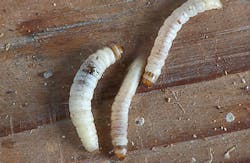Plastic-eating moth larva could speed biodegradation of polyethylene
Plastic waste which takes many years to break down is a growing environmental problem. While recycling programs have been established in some jurisdictions, most plastic still ends up in landfills.
But new research offers hope for the development of a single-step process of biodegradation, which could help to get rid of the otherwise persistent waste.
Jun Yang and colleagues discovered that bacteria from the guts of a worm known to munch on food packaging can degrade polyethylene (PE), the most common form of plastic.
The American Chemical Society (ACS) reports that the researchers focused their attention on a moth larva, known as a waxworm, which is capable of chewing and eating PE films. They found that at least two strains of the waxworm's gut microbes could degrade polyethylene without the need for pretreatment, such as exposing the plastic to light or heat.
The researchers incubated the two strains on PE films. After 28 days they found signs of degradation which included a 50 percent reduction in tensile strength and 30 percent reduced ability to repel water droplets. After 60 days, the mass of the plastic films was 10 percent lower and the molecular weights of the polymer chains dropped by 13 percent.
In a report in the ACS journal Environmental Science & Technology, the researchers said that their findings demonstrated the presence of PE-degrading bacteria in the guts of waxworms and provided promising evidence for the biodegradation of PE in the environment.
